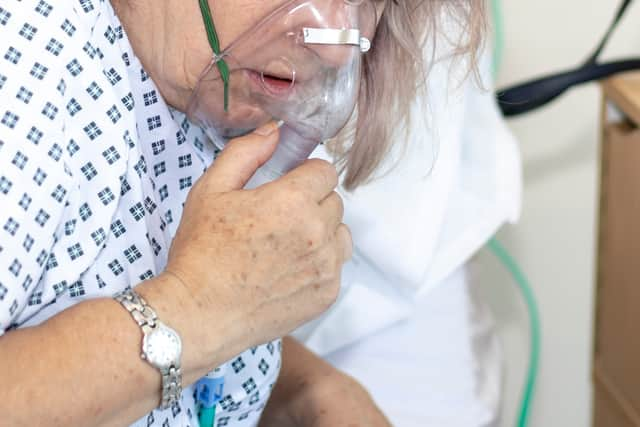COVID-19 hospital admissions rise sharply in Liverpool amid growing concern over BA.4 and BA.5 variants
and live on Freeview channel 276
The number of people hospitalised with COVID-19 has risen sharply across parts of Merseyside, with one NHS hospital trust in Liverpool recording a 55% increase in a week.
That is well above the 33% rise recorded across England, which comes amid growing concern over two Omicron sub-variants, BA.4 and BA.5.
Advertisement
Hide AdAdvertisement
Hide AdEvery region of England is now seeing increasing numbers of people being admitted to hospital with COVID-19, official figures show.


The UK Coronavirus dashboard shows the steepest rise was seen in the North West, where 741 people were admitted in the week to 14 June, up 55% from the previous week.
The North West also has the highest rate of hospitalisations, at 10.5 per 100,000 people.
COVID hospital admissions in Merseyside
In Merseyside, Liverpool University Hospitals NHS Foundation Trust, which includes Aintree, Royal Liverpool and Broadgreen hospitals, recorded a rise of 57%.
Advertisement
Hide AdAdvertisement
Hide AdSeventy-two patients were admitted in the week up to June 12, up from 46 the week before.
St Helens and Knowsley Teaching Hospitals NHS Trust, which includes St Helens and Whiston hospital, also saw a rise in COVID admissions above the national average, at 48%.
Forty-nine patients were admitted in the week up to June 12, up from 33 the week before.
Wirral University Teaching Hospital NHS Foundation Trust, which includes Wirral Women & Children’s Hospital Clatterbridge and Arrowe Park, saw an increase of 19%.
Advertisement
Hide AdAdvertisement
Hide AdWhile Southport and Ormskirk Hospital NHS Trust, which includes hospitals in both districts, recorded a 40% decrease.
Loading....
COVID variants in England
Most cases in the UK are still caused by the Omicron BA2 variant, originally dubbed ‘Stealth Omicron’, UK Health Security Agency (UKHSA) data shows.
But health chiefs are monitoring the impact of the variants Omicron BA.4 and Omicron BA.5, which were designated variants of concern in the UK on May 20.
Dr Mary Ramsay, Director of Clinical Programmes at the UKHSA, said: “After a period of low case rates, we are now seeing increases in outbreaks within care homes and in hospitalisations among those aged 80 years and over.
Advertisement
Hide AdAdvertisement
Hide Ad“It is encouraging that we are not seeing an increase in intensive care unit (ICU) admissions but we are monitoring data closely and assessing the possible impact of subvariants BA.4 and BA.5.
“As we enter summer, it’s still important to remember that Covid-19 has not gone away and to get vaccinated to reduce the risk of becoming seriously ill with the virus. If you’re not yet up to date with your jabs please come forward now – it’s not too late to get protected.
“Remember to observe good hand and respiratory hygiene. It is also sensible to wear a face covering in crowded, enclosed spaces. If you have any symptoms of a respiratory infection, and a high temperature or feel unwell, try to stay at home or away from others – especially elderly or vulnerable people.”
Comment Guidelines
National World encourages reader discussion on our stories. User feedback, insights and back-and-forth exchanges add a rich layer of context to reporting. Please review our Community Guidelines before commenting.
